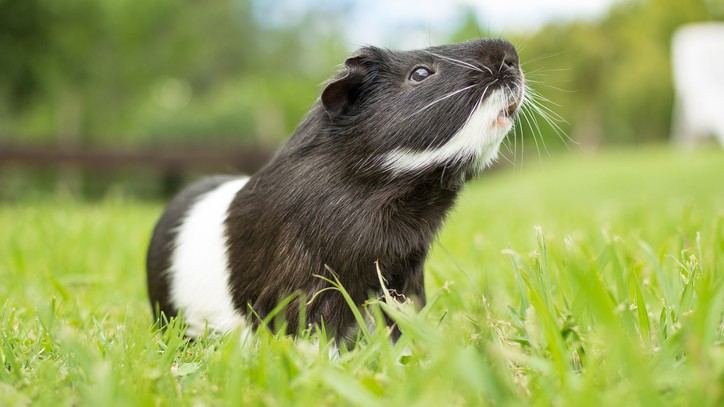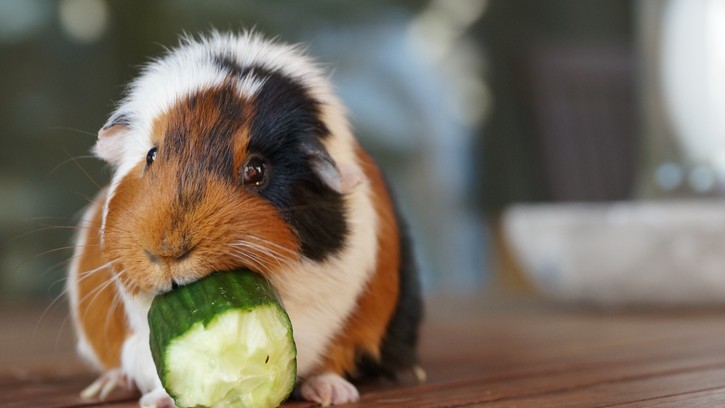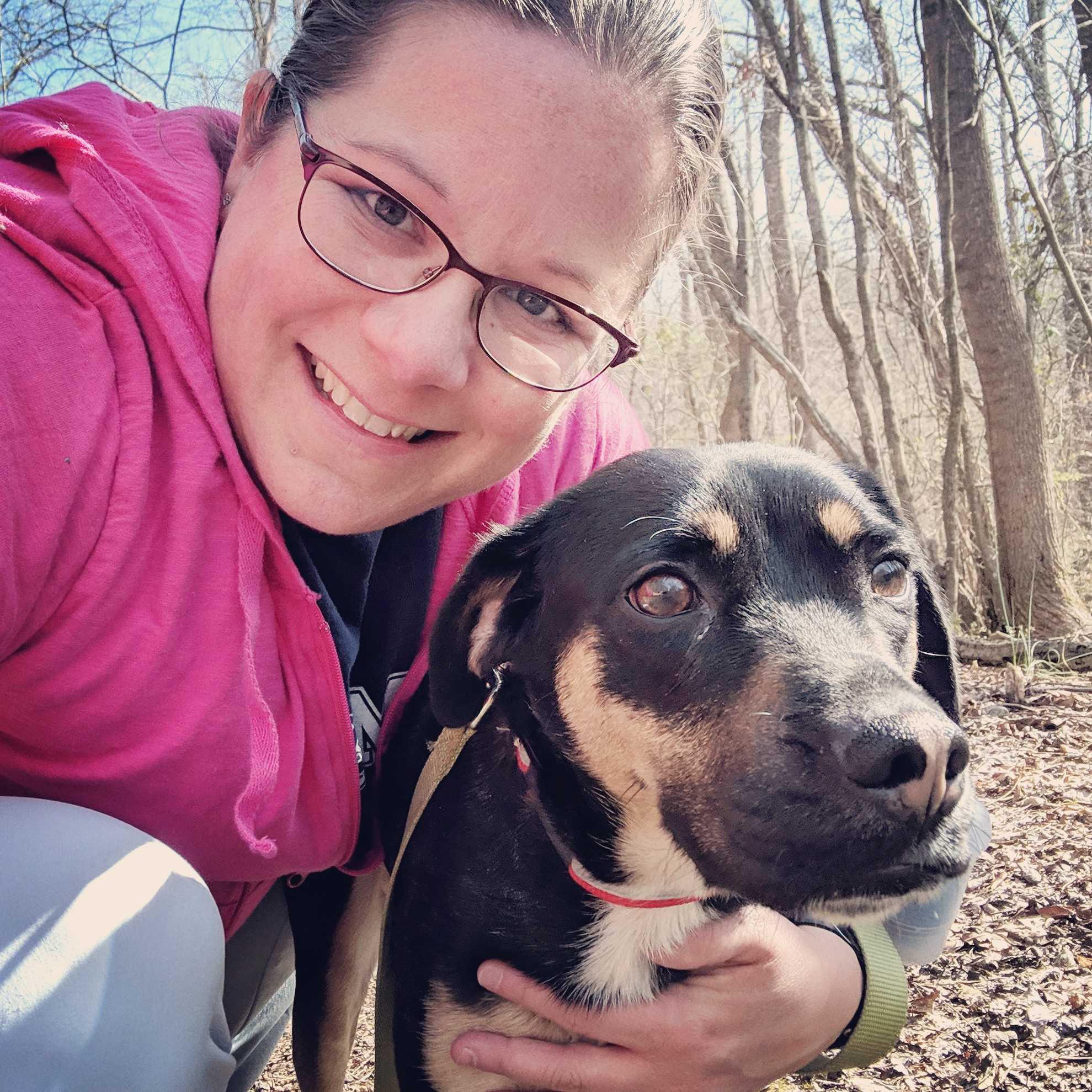Do guinea pigs sleep? 5 tips from a vet for happy, healthy guinea pig
Given their active nature, it’s only natural to wonder “do guinea pigs sleep?” To properly care for your new guinea pig, you should understand their behavior and medical needs.

If you share your home with a guinea pig, their constant activity may have you wondering “when do guinea pigs sleep?!” The honest answer to that question is “not very often,” but understanding guinea pig sleep schedules and other aspects of guinea pig behavior can make it easier and less stressful to care for your pet cavy.
- Best guinea pig accessories: Everything you need to amuse your furry friend
- How long do guinea pigs live? Your top six guinea pig questions answered
- Five popular guinea pig breeds: Which breed suits you best?
- Best hamster toys: Amazing accessories for a happy hamster
- Pets at Home Foxglove Guinea Pig and Rabbit Hutch review
1. Guinea pigs sleep every day, but not for very long
Cats, dogs, and even hamsters tend to spend much of their day dozing. At any given time, these pets are probably more likely to be asleep than awake. Guinea pigs, on the other hand, sleep a lot less than we do. Most guinea pig owners report that their pet sleeps just four to six hours a day, spending the rest of their time awake, eating, chewing, or playing.
In addition to requiring less sleep than other pets, guinea pigs are diurnal. Like humans, guinea pigs tend to be awake during the day and tend to sleep at night. This is in contrast to hamsters, for example, which are nocturnal, preferring to sleep during the day and be more active at night. This explains why you rarely see your pet guinea pig sleeping during the day.
Finally, while guinea pigs do sleep at night, they don’t sleep all night long. Most humans sleep more than four to six hours per night, so you’re not wrong if it seems like your guinea pig is awake while you are trying to sleep! If your guinea pig’s activity is keeping you awake at night, consider moving his or her cage to a separate area of your home, far from your bedroom. Guinea pigs are social animals, so you will want their cage to be in an area where they will receive human interaction. However, they are sensitive to loud noises, so you should avoid putting their cage right next to a TV, stereo, or other loud noisemaker.
2. Guinea pigs need a large, clean cage
Your guinea pig spends most of his or her time in a cage. Therefore, it’s important to make sure that the cage is the best hutch possible for your guinea pig. In general, the bigger the better! The Humane Society of the United States recommends at least 7.5 square feet of floor space for a single guinea pig, with 30” x 36” being a good size for a typical guinea pig cage. This size will allow your guinea pig to engage in some activity and exercise within the cage, which will keep your guinea pig healthy while also preventing boredom. You might want to consider buying one of the best rabbit runs, too, so your guinea pig can exercise in safety.
Paper bedding is the best bedding option for a guinea pig cage. You may see cedar or pine shavings marketed as acceptable bedding, but they contain chemicals that can be harmful for guinea pigs. This makes paper bedding a safer option. Ensure that there is two to three inches of bedding in your guinea pig’s, to absorb urine and other messes.
Use a cage that allows your guinea pig to walk and sleep directly on their paper bedding. Some commercially-available small animal cages would have the guinea pig walking and resting on a grate, with the bedding below the grate. This setup should be avoided, because standing on a wire grate can lead to foot infections.
Get the best advice, tips and top tech for your beloved Pets
- Best bedding for guinea pigs: Keep your fur friend clean and comfortable
- Guinea pig noises and body language explained

3. Guinea pigs need to chew constantly
Guinea pigs not only enjoy chewing, it’s literally something that they must do! Like other rodents, guinea pigs have teeth that keep growing throughout their lives. Without chewing, their teeth will become overgrown. Consistent chewing keeps the teeth worn down to an appropriate length, preventing potentially-serious dental issues.
Hay is the best “chew toy” for guinea pigs. Your guinea pig should always have access to fresh hay, which not only provides something to chew on, but also a source of fiber and nutrition. You can supplement this hay with chew toys for your guinea pig, which may be made of wood or cardboard. Avoid plastic toys for guinea pigs, because they can be harmful if chewed upon.
4. Guinea pigs need a balanced diet
There is no single, all-in-one guinea pig diet. Instead, guinea pigs need a combination of food items , to ensure they receive all of the nutrients they need. There’s a full explanation of this in our article Can guinea pigs eat grapes? Six guinea pig nutrition questions answered.
Approximately 10% of your guinea pig’s daily caloric intake, or about ⅛ cup of pellets per day, should consist of a pelleted guinea pig diet. Another 10-15% of your guinea pig’s diet, or approximately 1 cup daily, should consist of fresh vegetables. The remainder of your guinea pig’s daily food intake, comprising roughly 75% of the diet, should come in the form of fresh hay.
Guinea pigs require Vitamin C as a component of their diet, in order to prevent scurvy. Vitamin C in pelleted food degrades with storage, so you shouldn’t assume that your guinea pig’s pelleted food provides adequate levels of Vitamin C. Instead, focus on feeding vegetables that are high in Vitamin C, such as spinach, broccoli, kale, green peppers, and red peppers. You can also add Vitamin C drops to your guinea pig’s water on a daily basis. Fortunately, Vitamin C is a water-soluble vitamin; you can’t overdose your guinea pig because they will excrete any excess Vitamin C in their urine. Focus on ensuring that they get plenty of Vitamin C, without having to worry about overdoing it.
Fruit may be given as a special treat, but it should be limited to once or twice a week. Overfeeding fruit can lead to weight gain and obesity, due to high sugar levels that are found in fruit.
- What to do when your guinea pig is sick: Five common illnesses explained
- How long do guinea pigs live? Your top six guinea pig questions answered
5. Like other pets, guinea pigs need veterinary care
Guinea pigs are prone to develop a variety of health issues. Common health problems in guinea pigs include scurvy (Vitamin C deficiency), dental disease, skin parasites (mites or lice), ringworm, and diarrhea. If you see any signs of illness in your guinea pig, contact your veterinarian to schedule a physical examination. This will allow your veterinarian to diagnose the cause of your guinea pig’s illness and provide appropriate treatment.
Not all veterinarians are comfortable treating guinea pigs, so you may need to do some searching. It’s best to find a veterinarian as soon as possible after you obtain your guinea pig, so you know that you have one available when needed. Follow your veterinarian’s recommendations for preventive care and the management of any illness your guinea pig may develop.
Proper care improves health and quality of life
While a guinea pig may seem like a low-maintenance pet, it’s important to take your responsibilities as a pet owner seriously and ensure that you are meeting your guinea pig’s medical and social needs. By doing so, you can ensure that your guinea pig has a long, healthy, happy life.
Dr. Barnette is a graduate of the University of Florida, where she received both her B.S. in Zoology and her Doctor of Veterinary Medicine (DVM). She has 15 years of clinical experience as a small animal veterinarian, treating dogs, cats, and occasional exotic patients. She now works as a freelance veterinary writer, creating educational content for veterinarians, veterinary team members, and dedicated pet owners. Dr. Barnette lives in southwest Florida with her husband and daughter (plus two cats, a dog, and a rescued dove!) and enjoys kayaking, biking, and hiking. Learn more about Dr. Barnette at www.linkedin.com/in/catherinebarnette.

